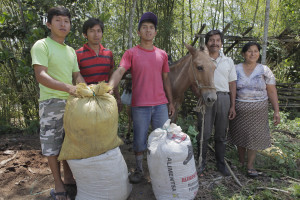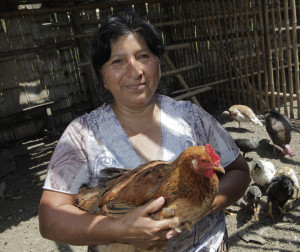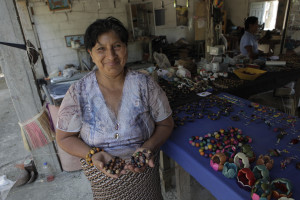Nancy Ascencio Neira lives with her husband, Galo, on their family farm in Manglaralto parish along Ecuador’s Pacific coast. They have seven sons; two have moved to Guayaquil, the nearest big city. One is studying at the university in Guayaquil and the rest live at home. Galo only attended school through the 6th grade and Nancy never went. “My parents said I was too pretty, and I would get married soon,” she said.
 Photo by Russell Powell
Photo by Russell PowellNancy and Galo wanted to give their children opportunities they didn’t have. “If we don’t educate our children, then their life will be as difficult as ours,” Galo said. However, sending their children to school was always difficult. “I haven’t been able to educate all our children because we are a low-income family,” he said.
In July 2010, they received 100 chickens as participants in a Heifer project. They later received two pigs, fruit trees, vegetable seeds and a backpack sprayer. Galo was excited to receive so many seeds because they wanted to diversify the plants and produce on their farm. “Since we produce our own vegetables, we no longer have to buy and that’s an additional income for us,” Galo said. Plus, their farm is now 90 percent organic and their produce is healthier.
 Photo by Russell Powell
Photo by Russell PowellThe chickens also made an immediate impact. Every two and a half months, they sell 100 chickens. After 15 months, they have earned more than $3,400. Some of the profit was used to buy raw materials for Nancy’s handicrafts, another source of income. She weaves baskets and makes jewelry to sell at a friend’s store, with part of these earnings saved for their children’s education. “The benefits we derive from Heifer don’t just help the adults, but also our children. Through this project we have been able to send our children to school,” Galo said.
Nancy said, “Education is very important, because in reality it is the only thing we have to give them.” She hopes that her children won’t stay in the city, but that they will be able to buy their own farms and have better lives. “I hope my children won’t abandon the land. I want to instill in them the idea that the countryside is good and that planting the land and caring for animals is also good,” Galo said.
The couple has also been able to purchase geese, mules and horses from the income they earned selling chickens. The mules haul the family’s produce to sell and helps move organic fertilizer and compost to the fields. Their horses are used by the agro-tourists that visit the area each year.
 Photo by Russell Powell
Photo by Russell PowellBesides boosting incomes, another long-term impact of this project is the changing role of women in the community. Nancy is no longer relegated to household chores; she helps with the farming, is a businesswoman and is president of Asociacion de Muejers Artesanas de dos Mangas, a local women’s handicraft association. “She provides us with additional income and a better economic standing,” Galo said. Nancy enjoys being able to contribute to the family income. “I have something to say when we make decisions about our money,” she said.
“Our community is now very conscious about living a better life,” Galo said. Non-project community members are seeking advice from group members. “Heifer is helping us and we are helping others, including our children,” Nancy said.
Galo likes Heifer’s approach because it is a simple idea. He said “the idea is to share and payback.”